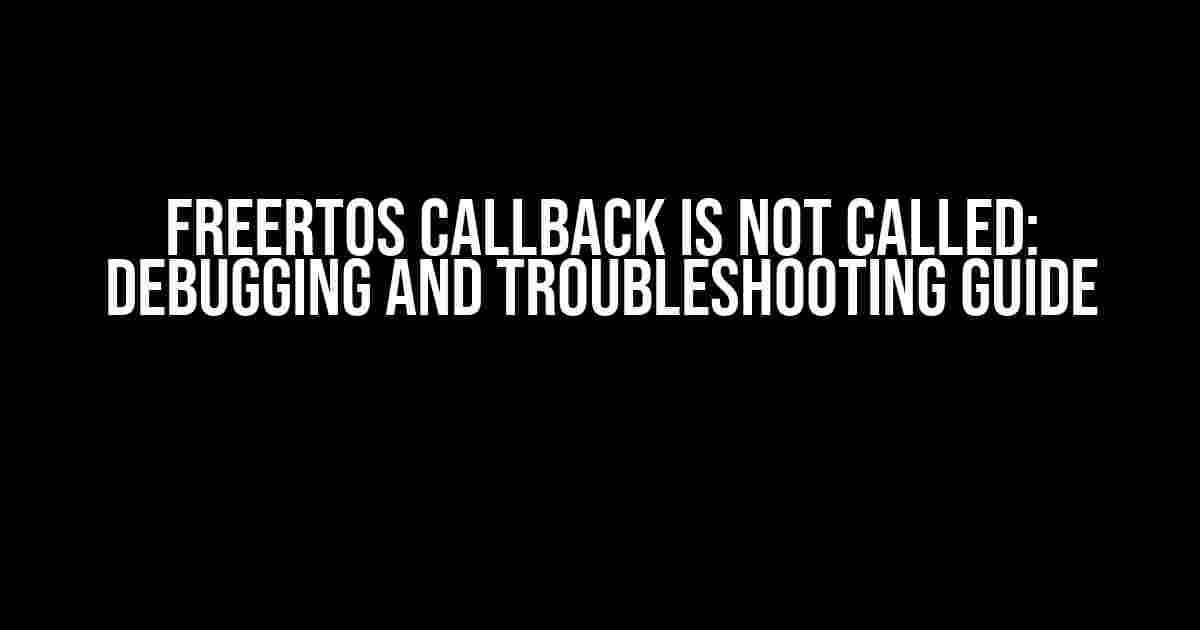Are you stuck with a FreeRTOS callback that just won’t trigger? Don’t worry, you’re not alone! In this comprehensive guide, we’ll walk you through the common causes, debugging techniques, and troubleshooting steps to help you identify and fix the issue. By the end of this article, you’ll be well-equipped to tackle even the most stubborn callback problems.
What is a FreeRTOS Callback?
A callback, in the context of FreeRTOS, is a function that is passed as an argument to another function. The receiving function then invokes the callback function at a later time, usually when a specific event or condition occurs. Callbacks are a crucial mechanism in FreeRTOS for handling asynchronous events, such as timer expirations, semaphore releases, or queue operations.
Symptoms of a Non-Triggering Callback
Before we dive into the debugging process, let’s identify the symptoms of a callback that’s not being called:
- The callback function is not executed when expected.
- The system behaves as if the callback was never registered.
- Debug logs or printf statements within the callback function are not output.
- Other tasks or threads continue to run without interruption.
Possible Causes of a Non-Triggering Callback
Let’s examine some common reasons why your FreeRTOS callback might not be triggering:
- Incorrect callback registration: Ensure that the callback function is correctly registered with the relevant FreeRTOS API.
- Invalid or null callback pointer: Verify that the callback function pointer is valid and not null.
- Stack overflow or underflow: Check that the task or thread stack has sufficient space to accommodate the callback function’s requirements.
- Prioritization issues: Confirm that the task or thread executing the callback has sufficient priority to run.
- Resource starvation: Ensure that the system has sufficient resources (e.g., RAM, CPU) to execute the callback.
- API misuse or incorrect configuration: Review the FreeRTOS API documentation to ensure that the callback is correctly configured and used.
- Hardware or peripheral issues: Investigate potential hardware or peripheral problems that might be preventing the callback from triggering.
Debugging Techniques for Non-Triggering Callbacks
To identify the root cause of the issue, employ the following debugging techniques:
1. Review the Code
Perform a thorough code review to ensure that:
- The callback function is correctly defined and implemented.
- The callback is properly registered with the relevant FreeRTOS API.
- The callback pointer is valid and not null.
2. Use Debug Logs and Print Statements
Insert debug logs or printf statements within the callback function to validate that it’s being executed. For example:
void myCallback(void *pvParameter)
{
printf("Callback triggered!\n");
// Callback implementation
}3. Analyze the Call Stack
Use a debugger or a tool like ARM’s Keil µVision to examine the call stack and identify the point of failure:
void vTaskSwitchContext(void)
{
// ...
while( pxTask != NULL )
{
// ...
pxTask->pxCallbackFunction(pxTask->pvCallbackParameter);
// ...
}
// ...
}4. Verify Task Priority and Scheduling
Ensure that the task or thread executing the callback has sufficient priority to run:
xTaskCreate(myTask, "My Task", 2048, NULL, 2, NULL);5. Check Resource Availability
Monitor system resources (e.g., heap, stack, CPU usage) to identify potential bottlenecks:
UBaseType_t ux AvailableHeapSpace = xPortGetFreeHeapSize();
printf("Available heap space: %d\n", uxAvailableHeapSpace);Troubleshooting Steps for Non-Triggering Callbacks
Now that we’ve identified the possible causes and debugging techniques, let’s walk through a step-by-step troubleshooting process:
| Step | Description |
|---|---|
| 1 | Verify that the callback function is correctly registered with the relevant FreeRTOS API. |
| 2 | Check that the callback pointer is valid and not null. |
| 3 | Review the task or thread stack configuration to ensure sufficient space for the callback function. |
| 4 | Verify that the task or thread executing the callback has sufficient priority to run. |
| 5 | Monitor system resources (e.g., heap, stack, CPU usage) to identify potential bottlenecks. |
| 6 | Analyze the call stack to identify the point of failure. |
| 7 | Consult the FreeRTOS API documentation to ensure correct configuration and usage. |
| 8 | Investigate potential hardware or peripheral issues that might be preventing the callback from triggering. |
Conclusion
By following this comprehensive guide, you should be able to identify and fix the issue preventing your FreeRTOS callback from triggering. Remember to methodically debug your code, review the FreeRTOS API documentation, and verify system resources and configuration. With patience and persistence, you’ll be able to track down and resolve even the most elusive callback issues.
Happy debugging!
Frequently Asked Question
Are you stuck with FreeRTOS callbacks not being called? Don’t worry, we’ve got you covered! Here are some common issues and their solutions to get you back on track.
Q1: Is my callback function correctly registered?
Make sure you’ve called the `xTimerCreate` function correctly and passed the address of your callback function as an argument. Also, double-check that your callback function is declared correctly and is of the correct type (i.e., `TimerCallbackFunction_t` type).
Q2: Is my timer initialized and started correctly?
Verify that you’ve called `xTimerCreate` and `xTimerStart` functions in the correct order and with the correct parameters. Ensure that your timer is not deleted or stopped before the callback function is called.
Q3: Is my callback function running in the correct context?
Remember that FreeRTOS callback functions run in the context of the timer service task, not in the context of your application task. Ensure that your callback function is thread-safe and doesn’t access resources that are specific to your application task.
Q4: Are there any other timers or tasks blocking my callback function?
Check if other timers or tasks in your system are blocking or delaying your callback function. Use debugging tools or logging mechanisms to identify any potential bottlenecks or blocking calls.
Q5: Have I enabled timer interrupts correctly?
Ensure that you’ve enabled timer interrupts correctly in your microcontroller-specific code. Also, verify that the timer interrupt priority is set correctly to allow the timer service task to run and call your callback function.

